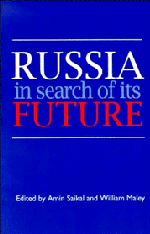8 - Russia's Relations with the Former External Empire
Published online by Cambridge University Press: 03 May 2011
Summary
In analysing the relationships between Russia and those countries formerly described as the Soviet Union's East European empire (that is, Bulgaria, Czechoslovakia, the German Democratic Republic, Hungary, Poland, Romania), this chapter will adopt two principal and closely related themes.
First, it is argued that the numerous bilateral and multilateral relationships in one sense reflect the domestic politics and relationships of communist and post-communist systems. Thus, during the communist era, the systems were more authoritarian, hierarchical, simple and stable. Conversely, the post-communist systems are more pluralistic, egalitarian (in some ways), complex and unstable. In addition, the current domestic scenes are typified by a plethora of new organisations (for example political parties) that are still crystallising; similarly, the international scene is typified by a multitude of new organisations, and changing relationships that are still crystallising.
Second, and intimately connected with the first point, both the domestic scene and international relations are in a state of flux and contradictoriness. There is the tension between desire and resistance–for instance, in the sense of the east European states simultaneously wanting to move closer to Western Europe, yet also wanting to retain their only recently gained independence of other, more powerful states. Then there is the tension between theory and reality.
- Type
- Chapter
- Information
- Russia in Search of its Future , pp. 123 - 141Publisher: Cambridge University PressPrint publication year: 1994



